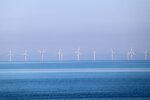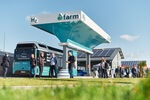10/01/2009
USA - U.S. wind turbine installations to reach 8,000 by 2015
Wind turbine sales in the U.S. are projected to grow by a compound annual growth rate (CAGR) of 9.7 percent to reach an annual production volume of almost 8,000 turbines with an average capacity of greater than 1 megawatt by 2015, according to a new report from Pike Research.
The report, Wind Energy Outlook for North America, indicates that wind power generation capacity in the U.S. passed the 25-gigawatt (GW) mark in 2008 by adding more than 8 GW from the previous year, according to the report. The market research company says this represents the largest individual gain of any country in the world.
This 50-percent growth rate exceeded growth in 2007, indicating that the market is still relatively young and has room to grow, despite the economic slowdown, said Pike Research. The market for wind turbines will continue to grow through 2015 driven by new generation additions as well as replacements of smaller, older turbines with new, larger, more efficient turbines, according to the report.
In 2007, generation capacity from renewable sources made up only 4 percent of the world’s electricity sources, but 16 percent of new electricity generation capacity additions were from wind energy, according to the report. In 2007, wind power accounted for more than 80 percent of new renewable power capacity additions.
The report highlights several reasons for wind power growth, which include growing demand for electricity, rising electricity prices, lower lifetime cost of kilowatt-hours (kWh) produced, and less land conversion requirements compared to solar or water diversion compared to hydroelectric. In addition, the wind power market is also benefiting from technological innovations that continue to lower the overall price of installing and operating wind farms, according to the report.
The report also indicates that tighter funding for wind energy projects may impede future growth, together with overcoming transmission constraints in congestion, reliability and access.
Although the report notes that construction of current developments has continued on pace since the start of the credit crisis in September 2008, with GE announcing that it would install 100 MW in the U.S. (Illinois) and Mitsubishi confirming it would deliver around 400 MW to Iberdrola Renewables in the U.S. through 2012, these are fulfillments of orders placed before the recession.
New orders are not expected to continue to grow at the rate they have in recent years, according to Pike Research. However, the report finds that many turbine manufacturers (OEM and components) have long-term service contracts that bring in stable annuity revenues that may compensate for declining new turbine orders.
For more information please contact Trevor Sievert at ts@windfair.net
The report, Wind Energy Outlook for North America, indicates that wind power generation capacity in the U.S. passed the 25-gigawatt (GW) mark in 2008 by adding more than 8 GW from the previous year, according to the report. The market research company says this represents the largest individual gain of any country in the world.
This 50-percent growth rate exceeded growth in 2007, indicating that the market is still relatively young and has room to grow, despite the economic slowdown, said Pike Research. The market for wind turbines will continue to grow through 2015 driven by new generation additions as well as replacements of smaller, older turbines with new, larger, more efficient turbines, according to the report.
In 2007, generation capacity from renewable sources made up only 4 percent of the world’s electricity sources, but 16 percent of new electricity generation capacity additions were from wind energy, according to the report. In 2007, wind power accounted for more than 80 percent of new renewable power capacity additions.
The report highlights several reasons for wind power growth, which include growing demand for electricity, rising electricity prices, lower lifetime cost of kilowatt-hours (kWh) produced, and less land conversion requirements compared to solar or water diversion compared to hydroelectric. In addition, the wind power market is also benefiting from technological innovations that continue to lower the overall price of installing and operating wind farms, according to the report.
The report also indicates that tighter funding for wind energy projects may impede future growth, together with overcoming transmission constraints in congestion, reliability and access.
Although the report notes that construction of current developments has continued on pace since the start of the credit crisis in September 2008, with GE announcing that it would install 100 MW in the U.S. (Illinois) and Mitsubishi confirming it would deliver around 400 MW to Iberdrola Renewables in the U.S. through 2012, these are fulfillments of orders placed before the recession.
New orders are not expected to continue to grow at the rate they have in recent years, according to Pike Research. However, the report finds that many turbine manufacturers (OEM and components) have long-term service contracts that bring in stable annuity revenues that may compensate for declining new turbine orders.
For more information please contact Trevor Sievert at ts@windfair.net
- Source:
- Online editorial www.windfair.net
- Author:
- Posted by: Trevor Sievert, Online Editorial Journalist
- Email:
- ts@windfair.net
- Link:
- www.windfair.net/...
- Keywords:
- wind energy, renewable energy, jobs, wind turbine, wind power, wind farm, rotorblade, onshore, offshore


























